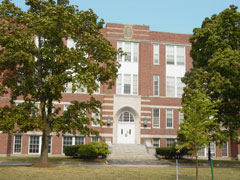Our current-day Field-based graduate programs in education began at Trinity College of Vermont as a traditional, campus-based, M.Ed. program in 1992. Within a short period of time, the faculty and administration felt that Trinity College’s mission of “serving the underserved” was not being fulfilled. With that in mind, the program changed both its curriculum as well as its delivery in 1995, starting the first phase of a restructured graduate program by graduate sites off-campus where there was a need. Quickly after that, professional educators who already had Master's Degrees expressed an interest in joining such rich learning cohorts. The Certificate of Advance Graduate Study (CAGS) was created to accommodate these learners with more complex opportunities as well as the opportunity to learn with their colleagues. At the same time, The Professional Development Outreach Center was created as another vehicle to support professionals in schools and other locations. Upon the closure of Trinity College in 2001, these highly regarded degree and non degree programs then affiliated with Southern New Hampshire University because of its common philosophy and mission.
The Vermont Campus of SNHU's School of Education has developed the M.Ed and CAGS programs to offer a pathway to an administrative endorsement through our alignment agreement with the VT Agency of Education. In addition, scholarships for degree students enable teachers and leaders to investigate educational delivery models and instructional practices around the world. In 2017, due to alumni requests and an analysis of state-wide leadership development needs, SNHU School of Education - Vermont Campus began to offer the Doctorate of Education (Ed.D.) through graduate sites off-campus where there is an opportunity to serve dedicated, qualified, educational professionals at this level. Today, SNHU's Vermont Campus provides a selection of graduate degrees and advanced certificates at many different locations throughout Vermont. Alternative professional development also occurs in a variety of ways through original course work created through the Professional Development Outreach Center, which works with partners in Vermont, New England, across US, and internationally whenever we can.

Our Constructivist Philosophy
Our graduate programs are designed to Remind our students of their professional strengths, assist them in Refining their classroom practices, and support them to Renew their perspective on their work within the field of education.
Education in our minds leads to empowerment, perhaps first suggested by Paulo Freire (1970) as he shared his conviction that, "every human being, no matter how [confused] or submerged in the “culture of silence” is capable of looking critically at his world in a dialogical encounter with others, and that when provided with the proper tools for such encounter he can gradually perceive his personal and social reality and deal critically with it. This sort of educational experience [brings him] to a new awareness of self, a new sense of dignity; he is stirred by new hope." As educators, the opportunity to work in concert with our peers empowers us to look within to strengthen our classrooms rather than to simply bow to the pressures that come from the outside.
Freire's comments taken today suggests that our best work as professional educators happens when we are building off of our own prior knowledge and experience as well as the knowledge and experience of our colleagues. The learning theory that represents this type of learning best is a constructivist learning theory. Constructivism is a theory about learning and knowledge or the "construction of learner generated solutions" (Catherine Fosnot, 1993). Even more simply put, it is about student directed learning.
It is our responsibility as a program to provide our students with learning opportunities that focus on "big ideas" or primary concepts; in our case, within the areas of leadership, curriculum, assessment and evaluation, learning, and instruction and technology. We take this responsibility very seriously. Another essential element of a constructivist classroom is to insure relevance to the learner, modifying and adapting that content to meet what our students need and/or want to improve within their own individual circumstance. That's where "student direction" applies. We take this responsibility even more seriously. The learner is different, therefore the application of content varies.